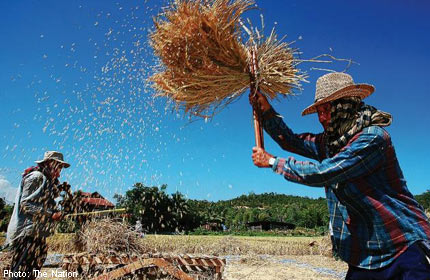
The interview with rice farmers in Pathum Thani seemed to be just another question-and-answer session from the beginning to the end. But just before the reporter's departure, Saibua Krupae, a former farmer, suddenly said: "I don't dare to eat our own rice nowadays."
He looked sad and his eyes did not hide his worries. He lowered his voice and said his fears were because he knew how many chemicals were being used to grow rice. At least seven kinds of fertiliser and pesticides are used with each crop.
Now 56, he quit his job as a farmer two years ago after having spent three decades in the field of agriculture. Saibua has passed on the mantle to his two sons, who rent 30 rai of land each to grow rice, as they only own 10 rai.
"My body cannot take it any more. It was I who sprayed pesticide [in the rice field] in the past," he said, adding he was critically hospitalised three times after spraying chemicals in three crop seasons.
He has now become a petrol retailer in the village at Moo 9, Tambon Beung Kham Proi in Lam Luk Ka district. He also does other odds jobs, such as a land broker.
The family buys rice from Surin for consumption, and only from trusted mill owners.
"They [in the Northeast] grow rice only once a year up there, and they use less chemicals," he said, adding he had been trying to convince his sons to use less chemicals while growing rice.
After the government announced the rice-pledging scheme with a price of Bt15,000 per tonne, land rent shot up to Bt1,500 per rai per season. Some landlords took 80-100 kilograms of rice paddy, up from 60-70kg in the past, he said.
Despite the hike in costs, farmers in his village were happy to pay the rent, but invest even more in chemicals with the hope of increasing productivity.
"Deserted land, no matter what it was before, has been turned into ricefields now," Narong Cheuncharoon, a former village chief, said. "Productivity has been low lately. Since the flood [in 2011], the only crop that was productive was the crop right after the flood," Narong said. He added that he used to have a yield of one tonne of rice paddy but it has been as low as 400-500 kilograms per crop lately.
"It's been bad recently, every [farmers'] household faces the same problems. The soil gets no respite, and it is losing its fertility," he said.
His family grew rice on 20 rai of land and reaped 12 tonnes of rice paddy this crop compared to 18 to 20 tonnes in the past.
"This year is about breaking even. We invested almost Bt100,000 and sold rice for a little over Bt100,000," he said.
Yongyut Kuntaweethep, 70, retired kamnan of Beung Thonglang district, said productivity was constantly dropping. It used to be more than 600kg of rice paddy per rai 10 years ago. During the Abhisit Vejjajiva government it was 570 and now the official survey by the local agricultural officer shows 540kg per rai.
Deputy village chief Rewat Pienpeung said no one was willing to listen and take a break. They start a new crop as soon as they had sold rice from the previous crop.
Saibua, Narong and Rewat agreed that with the government's rice-pledging scheme, productivity is part of the indicator if farmers can make profit. If the productivity rate is low, they will have to bear the loss themselves. However, under the previous government's price guarantee scheme, their income would at least cover the cost as the figure would be calculated based on their farming area.
However, many farmers were not so honest and reported farming area bigger than the land on which they actually grew rice at that time, they said.
